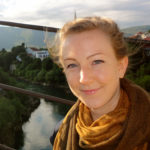Farming in Minnesota:
A taste of home
From women’s boutiques to neighborhood cafes, it’s easy to spot the Somali entrepreneurial spirit in Minneapolis’s Cedar-Riverside neighborhood. But now, some Somali-Americans are beginning to look outside the city limits for entrepreneurial paths, and organic farming in rural Minnesota is gaining some traction.
Through a farmer training program in Washington County, a small but growing group of Somali-Americans are hoping to boost incomes and improve access to healthy food in their community. They’re part of a new generation of Americans who are turning to sustainable farming to make a living as the current population of farmers nears retirement.
And lawmakers are taking notice. Last month Rep. Tim Walz (D-MN) and Rep. Jeff Fortenberry (R-NE) reintroduced the Beginning Farmer and Rancher Opportunity Act, which “lays out a national beginning farmer strategy that breaks down barriers to entry and gives real support to the next generation” in the form of access to affordable land, skills, financing and crop insurance.
Under a blue-grey October sky, a group of volunteers take down a greenhouse at Big River Farms near the town of Scandia, a 45-minute drive northeast of Minneapolis. The 150-acre incubator farm offers hands-on farmer education, land, and equipment for immigrants and people of color.
The growing season is winding down, but Naima Dhore’s quarter acre plot is still a colorful display of Swiss chard, curly kale and carrots. Her two sons run around in their rubber rain boots, jumping in puddles while Dhore washes the mud off a carrot for them.
“My husband works a lot so trying to juggle between my children and my work and here, it’s a lot. But I’m passionate about farming, I love it, and it’s a beautiful place here,” Dhore said.
In Somalia, Dhore grew fruits and vegetables in a small home garden. When the civil war broke out, she left with her family and eventually resettled in Minnesota.
Several years ago, Dhore and her husband started growing herbs in their apartment, but they wanted to do more. So she turned to YouTube videos to learn about farming and eventually found out about the Big River Farms Training Program.
Through a mix of donors, and private and federal grants, the program has grown over the last ten years. And the funding is set to increase, now that the Minnesota Food Association is becoming part of a larger, better funded nonprofit called The Food Group.
Everyone is selling something or everyone wants to open a business or owns a business. So there’s a future in farming here.
Somali community organizer
Laura Hedeen is the program manager at Big River Farms, which is already providing significant support to aspiring farmers.
“We have an incubator farm that is certified organic, and we lease land and infrastructure to those farmers to decrease the risk they have to take on themselves,” Hedeen said. “We also offer a lot of classes and technical assistance, from production to business planning to marketing – all the aspects that are involved with starting your own farm business.”
Participants can sell produce through a farm share or CSA — Community Supported Agriculture — where customers pay before the season starts, and then receive regular shares of the harvest. The growers also have the option of selling their produce at farmers’ markets or wholesale, either on their own or through Big River Farms.
Participants graduate after three or four years, but they can continue growing food at Big River Farms for an additional three years.
“Right now I’ve been getting a lot of interest from the Somali community, I think in the large part because of Naima. She’s a good spokesperson,” Hedeen said.
The classes, land, equipment, and seeds can add up to $700 or more during the first year – and that doesn’t include the cost of gas. While some participants are able to break even by selling their produce, the upfront costs and time commitment can be prohibitive for some.
Still, this year, a third of the 17 farmers are Somali-American. Abdirizak Bihi, a Somali community organizer, featured Naima Dhore on his KFAI radio show. He says employment opportunities are lacking in the community, but Somali-Americans are entrepreneurs.
“Everyone is selling something or everyone wants to open a business or owns a business. So there’s a future in farming here. It’s very good economically for Minnesota and also the community,” Bihi said.
Participants bring a variety of goals to the program. Some want to get into farming become full-time farmers, some hope to grow food for their family and generate income by selling their produce some money on the side. For Naima Dhore, farming is a commitment to the Somali community.
“My goal and my focus for next year is continue farming and doing education programs where I could support the community to have access to healthy food, and more importantly organic food,” she said.
But holding down a job and working towards her degree means Dhore does most of her farming at dawn, dusk, or on the weekends.
“I actually had my dad come out here one night, and I had to harvest to sell at the farmers’ market the following day, and it was getting really dark. He said, ‘You’re just crazy. I can’t believe you’re out here doing this alone.’ But he gets it,” Dhore said.
There may be some relief in sight. Big River Farms has generated enough interest that the organization will open a satellite farm closer to the Twin Cities. Hedeen is hopeful a site closer to the Cedar-Riverside neighborhood of Minneapolis will make it easier for more Somali-Americans to participate.
This story was produced as part of the “Crossing the Divide” reporting fellowship and made possible with support from the Solutions Journalism Network.
Hear the audio version of this story.

































